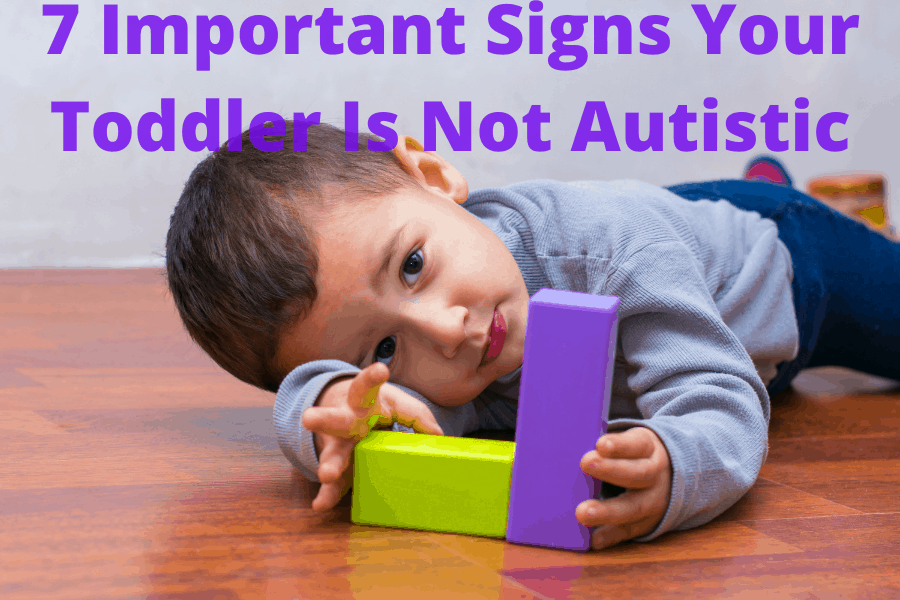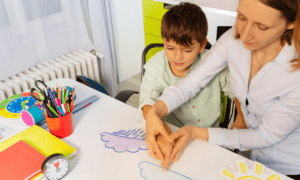This post may contain affiliate links which means I may receive a commission from purchases made through links. I will only recommend products I have personally used. Thanks.
What are the signs your toddler is not autistic? Well, it is a commonly asked question. Parents, especially new ones, often get worried about their child’s behavior. Is this normal behavior? Or autism? Autism is a condition that can cause a group of neurodegenerative disorders. By age 2, a professional diagnosis is reliable.
As a parent to an autistic child, I am very much aware of the anxieties around not knowing if the symptoms your child presents with are typical of normal behavior or attributable to autism. In this article, we will discuss signs that will reassure you that your child is not autistic.
There is no cure for autism, though if diagnosed early, it can be easy to manage. Hence, every parent needs to understand what autism is and what are its early signs? And it is even more important to know the signs that suggest your toddler is not autistic.
Watching your baby grow is a heavenly experience, but it comes with anxiety. Is your child shy? Or is displaying autism-like behavior? Are there any reasons to worry? Or is it only you who is overthinking? Well, every parent, at some point in their parenthood, has the same thoughts.
As your child grows, you become more observant of their behavior. All parents often compare their children to their cousins or peers. It is called competitive parenting.
But as a parent, you should always follow your instincts. If you note your child is not growing as his peers, do not brush off this feeling and talk to your doctor. Whether autism runs in your family or your baby shows abnormal behavior patterns, you should get expert advice.
But the question is how to know if your child has autism or not? Well, keep reading this article till the end to get your answers.
What is autism?
Autism, also known as Autism Spectrum Disorder (ASD), is a developmental disability that can cause significant challenges in social interactions, communication (verbal or non-verbal), and repetitive behaviors.
The symptoms of autism can vary from patient to patient. Individuals with autism think and behave differently than others.
Autism is a common condition. According to the CDC’s Autism and Developmental Disabilities Monitoring (ADDM) Network, 1 in 54 children is diagnosed with an autism spectrum disorder. Boys are four times more affected by ASD than girls.
Causes and risk factors of autism
The exact cause of autism development is still unknown. But if you consider the complexity of the problem and the variation of severity and symptoms, there may be several factors involved.
The two leading causes of autism are
1. Genetics
Autism is hereditary. Genetic mutation can increase the risk of autistic spectrum disorder. But many genetic diseases can also cause autism.
2. Environmental factors
Environmental factors such as viral infections, certain medications, air pollutants, or complications during pregnancy are in question. Researchers are finding the relation between environmental triggers and autism.
THERE IS NO LINK BETWEEN VACCINES AND AUTISM.
Early signs and symptoms of autism in toddlers
The symptoms are of wide range, known as “spectrum.” The symptoms first appear in infancy and early childhood and cause delays in primary development such as speech, social interaction, and learning.

Some children only experience mild symptoms though, on the other hand, others may be severely affected by autism. But every child has problems in three areas:
- Communicating with others
- Pattern of behavior
- Interacting with others
The 7 typical signs of autism are:
-
Delayed speech and difficulty communicating with others
-
Avoiding eye contact and persistent preference for solitude
-
Difficulty understanding others’ feelings and emotions
-
Reliance on routine
-
Can’t accept minor changes
-
Interest in a narrow range of activities or objects
-
Repetitive movements such as clapping or flapping of hands
In most cases, autism is diagnosed at the age of 3. As your child grows, signs become more unclear to detect. If you feel something is off, contact a doctor as soon as possible.
Remember, the earlier, the better. Early detection of autism increases the likelihood of treatment success. Your doctor will listen to your concerns and help you. He will also educate you on normal toddler behavior versus autism.
Autism red flags can help check developmental milestones in your 3-year-old. What are the signs of an autistic child at the age of three? These include
- Prefer being alone, difficulty separating from mother or caregiver
- Delayed speech and doesn’t respond to their names, do not use short phrases
- Is not interested in playing with other kids or pretend play
- Difficulty expressing their feelings and being indifferent
- Difficulty understanding the atmosphere and other’s feelings
- Can’t understand jokes and does not follow instructions
- Repeat what they say and have difficulty manipulating objects
- Doesn’t answer questions accordingly and does not use gestures (like waving), or make facial expressions
7 important signs your toddler is not autistic
But do these symptoms indicate that your child has autism? Is it possible that your child is showing autism-like behavior but not autistic? It is not always easy to differentiate between autism and other behavioral challenges. That’s because there is a blurred line between these two, and some behavior patterns appear almost similar.
So, how do you tell the difference between normal toddler behaviors versus autism? Well, there are some differences between shyness and autism. Although autistic and non-autistic shy children may avoid making eye contact, a shy kid would eventually warm up after some time. He may also join in with others at the playground after watching from the sidelines. Over time, they become friendlier and happily interacts with others.
On the other hand, an autistic child is indifferent all the time. No matter how much time you spend with them, they still avoid eye contact even with their parents.
Some signs will indicate that your toddler is not autistic and developing impressive communication skills on time. Many people think their child is autistic though he is not if he can:
-
Use 4-5 word sentence
-
Understand instructions and most sentences
-
Mimic his parents or other kids
-
Categorize objects based on colors and shapes
-
Openly affectionate and separates easily from his parents
-
Kick the ball, run, jump, and climb the stairs well
-
Play make-believe or pretend to be a doctor, teacher, fireguard, or any other character.
If your child is successfully achieving the above-mentioned developmental milestones, then you do not have to worry. But if something concerns you, talk to your doctor about it. Do not just wait and see. Remember, you know your child the best. If you continue to worry, schedule a visit.
Now we know the developmental milestones for a toddler. But when do you need to speak to a doctor? There is much data available online on normal toddler behavior versus autism. You can surely get help from there.
Guidance for parents
If you are still concerned that your toddler is showing autism-like symptoms, but you are unsure if they are truly autistic, there are checklists available online that will tell you whether your child has autism or not. These checklists include
These checklists consist of various questions regarding your child’s behavior. You have to answer yes or no. The website scores your child and tells the risk of developing autism.
ASDetect is an app that helps parents and caregivers to examine their child’s social and communication behavior. It can help detect early autism in children younger than two and a half years (11 to 30 months). This app tells the likelihood of your child developing autism.
Now you may be questioning yourself like, “I think my child is autistic but is he?” It is normal for a committed parent to have these anxieties, but it is equally possible that you may be worrying over nothing. To put your mind at ease, consult a pediatrician early and tell him your concerns.
What to do if your toddler shows early signs of autism?
Parents of an Autistic Child can be under great stress. Taking care of an autistic child is a challenging privilege. Children with autism need so much attention and focus from their parents. As a result, parents are left with little time or energy to focus on their other children or other aspects of their lives.
Along with medical care and therapies, your toddler needs your support. So, what should you do? Here are some parenting tips that will help you and your toddler
- Learn what autism is and how to manage it.
- Make a routine for your toddler.
- Interact with other parents with an autistic child
- Get professional help for different scenarios
- Be positive and stay consistent
- Develop activities for your toddler that will help them learn
- If you can afford it, get respite care. It means hiring a caregiver for your baby.
- Be patient- most children with autism have positive outcomes, although this may take time.
Final Thoughts
Now you can differentiate between normal behavior and autism. The 7 signs your toddler is not autistic will help you.
What to do next? Well, if you are still worried, the best thing is to talk with a doctor. Research a little more into the condition and gather information about signs and symptoms. Also, consider speaking to your child’s school teacher about his behavior. And ask for a complete evaluation. Good Luck- you can handle this.
Other post you may like:
FUSSY EATING- 7 EASY STEPS TO HELP YOUR BABY GET REQUIRED NUTRIENTS
9 Effective Ways to Handle Toddler Aggression
7 Simple and Effective Steps You Can Take Now if Your Baby is Not Eating
5 Effective Ways to Handle Separation Anxiety in Toddler Age 3 and above
Related Posts
- How Can You Tell If Your Baby Is Autistic
How can you tell if your baby is autistic? What are the first signs of…
- 9 Effective Ways to Handle Toddler Aggression
Do you constantly deal with toddler aggression, including willful disobedience, howling, physical aggression, and verbal…
- 7 Simple Ways to Stop a Toddler Hitting Parents
The case of a toddler hitting parents is understandably concerning. Worse still is the fear…








